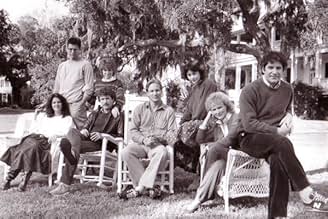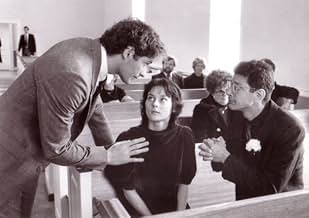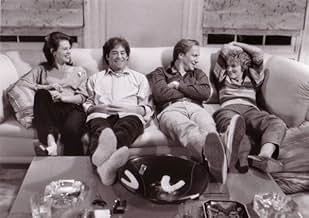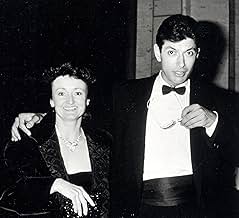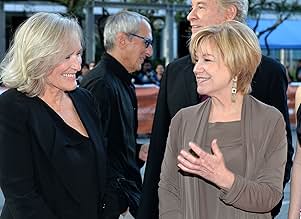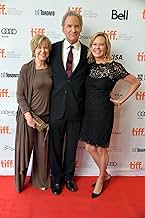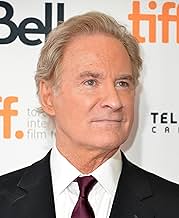In un weekend di sesso, droga, ricordi e pazzie, un gruppo di amici si ritrova e scopre che la vita è più facile se non si è soli.In un weekend di sesso, droga, ricordi e pazzie, un gruppo di amici si ritrova e scopre che la vita è più facile se non si è soli.In un weekend di sesso, droga, ricordi e pazzie, un gruppo di amici si ritrova e scopre che la vita è più facile se non si è soli.
- Regia
- Sceneggiatura
- Star
- Candidato a 3 Oscar
- 3 vittorie e 8 candidature totali
Jonathan Kasdan
- Harold and Sarah's Son
- (as Jon Kasdan)
Jake Kasdan
- Autograph Seeker
- (as Jacob Kasdan)
Recensioni in evidenza
Reunions of former college mates can be an enthusiastic, but also dramatic experience, mainly when you have shared with your now adult friends great ideals in a better and just world, and all those ideals have been abandoned in favour of professional careers and wealthy lives and, moreover, when the only mate who has faced the unfillable gap between the ideal and the real has just committed suicide and thus caused that same reunion.
Single sense of more or less pretended personal self-fulfilment, but hiding a dramatic sense of disillusionment, is rendered through noteworthy dialogues: intelligent, witty, ironical, sensitive and deep. Each protagonist will have to take off his/her mask, and show himself/herself for what he/she is now: the easy and devouring enthusiasm of those, not so distant, at least chronologically, but mentally and emotionally buried times cannot be acted for long. The only form of consolation, a very significant one, actually, is the possibility to share this sense of disillusionment, and the understanding that the only way out of personal dramas is communing with others.
Evidently, the actors, nowadays known as talented performers, but not so famous in 1983, are more than good. Not to mention the soundtrack, which contributes strongly to the emotional impact of the movie and makes one feel like rediscovering the great and out of time hits of the 60's, 70's. A cult and must see movie.
Single sense of more or less pretended personal self-fulfilment, but hiding a dramatic sense of disillusionment, is rendered through noteworthy dialogues: intelligent, witty, ironical, sensitive and deep. Each protagonist will have to take off his/her mask, and show himself/herself for what he/she is now: the easy and devouring enthusiasm of those, not so distant, at least chronologically, but mentally and emotionally buried times cannot be acted for long. The only form of consolation, a very significant one, actually, is the possibility to share this sense of disillusionment, and the understanding that the only way out of personal dramas is communing with others.
Evidently, the actors, nowadays known as talented performers, but not so famous in 1983, are more than good. Not to mention the soundtrack, which contributes strongly to the emotional impact of the movie and makes one feel like rediscovering the great and out of time hits of the 60's, 70's. A cult and must see movie.
There was something about this movie which I couldn't place my finger on. Although I barely made the 60's, of which all the characters are reminiscing of and therefore perhaps I maybe missed some subtle messages or didn't get some in-jokes about the 60's, this movie still applies to everyone. I guarantee every generation will have a time where they come back after 10 or 15 years and see friends that had been so important but are now barely on the radar. They will have a weekend of drinking and tears and fights and laughter. You will look at someone and remember a deep, hidden passion for them that you felt so long ago and never shared with anyone.
That is of course, the plot of the movie.
7 friends (who go wayyy back) one husband (who disappears pretty quickly) and a widowed girlfriend (who is barely known by anyone) come together after they learn that Alex, a friend formally part of the clique, had committed suicide (this part was infamously played by Kevin Costner). They have a weekend of sex, drugs, and good ol' fashioned rock and roll, the whole time bringing up past ghosts that had seemed long forgotten and faded. This is touchy subject, even in today's standards. Yet the movie handles it beautifully. My favourite section in the whole movie was when `You can't always get what you want' was played at his funeral. Not for the song, although it is a classic but for how the characters react. Each sit there in the church, some smiling quietly to themselves, while others have a sadden expression, remembering great times that were and never will be again. Every person has a song like that, one that makes you remember your friends, one that makes you sad or laugh and or grin to yourself as you remember the things you did. That to me clinches the movie. It shows how true the script is, and how humanly the characters react. There is a lot of angry hype about the movie, how there is too much talking and not enough sex or car chases or whatever people think is missing. Yet for me, it is reality. When something like this happens in real life, people do not over dramatise. Life is not a soap opera, although movie-goers seemed to want this movie to be. In a real-life situation, people would do exactly what the characters did, examine themselves and try to find a reason for the problems that have happened. Yet the hard truth is, especially about suicide, sometimes, there is no one you can blame. I think people didn't like this movie too much because it rang too true. It was too realistic. People go the movies to be entertained, to fall in love with the fairy-tales lives that movies have. This movie is honest. It seems, for now, people just want to be naïve and live in a fantasy world. If you want a true movie, see this one now.
That is of course, the plot of the movie.
7 friends (who go wayyy back) one husband (who disappears pretty quickly) and a widowed girlfriend (who is barely known by anyone) come together after they learn that Alex, a friend formally part of the clique, had committed suicide (this part was infamously played by Kevin Costner). They have a weekend of sex, drugs, and good ol' fashioned rock and roll, the whole time bringing up past ghosts that had seemed long forgotten and faded. This is touchy subject, even in today's standards. Yet the movie handles it beautifully. My favourite section in the whole movie was when `You can't always get what you want' was played at his funeral. Not for the song, although it is a classic but for how the characters react. Each sit there in the church, some smiling quietly to themselves, while others have a sadden expression, remembering great times that were and never will be again. Every person has a song like that, one that makes you remember your friends, one that makes you sad or laugh and or grin to yourself as you remember the things you did. That to me clinches the movie. It shows how true the script is, and how humanly the characters react. There is a lot of angry hype about the movie, how there is too much talking and not enough sex or car chases or whatever people think is missing. Yet for me, it is reality. When something like this happens in real life, people do not over dramatise. Life is not a soap opera, although movie-goers seemed to want this movie to be. In a real-life situation, people would do exactly what the characters did, examine themselves and try to find a reason for the problems that have happened. Yet the hard truth is, especially about suicide, sometimes, there is no one you can blame. I think people didn't like this movie too much because it rang too true. It was too realistic. People go the movies to be entertained, to fall in love with the fairy-tales lives that movies have. This movie is honest. It seems, for now, people just want to be naïve and live in a fantasy world. If you want a true movie, see this one now.
10kal1
After reading several of the user comments on this movie, it is clear that many people missed quite a bit. Those "funny one-liners" (and there are plenty!) are much more than that: they tell us volumes about the characters. This movie certainly does not spell anything out to the viewer (except, perhaps, the obvious), so you must be able to find the meaning behind the words. If you listen to what the characters are saying, then you can understand their past relationships, their present feelings, which friends have stayed close, etc. Remember, these are old friends: the script is very realistic so the characters are not going to explain every line to one another. I believe to truly enjoy this movie you need to pay close attention to all of the details and understand a bit about the attitudes and ideals of the two eras the movie depicts.
Wonderful, intelligent movie!
Wonderful, intelligent movie!
When I was a student at Cambridge in the early eighties, shortly before "The Big Chill" came out, a friend of mine had a poster on his wall entitled "Woodstock Tenth Anniversary Reunion". (The actual anniversary had taken place in August 1979, not long before we went up). The joke was that those attending the reunion were all middle-class professional types, smartly dressed in lounge suits with well-trimmed short hair. This poster exemplified the way in which my generation saw the baby boomers, twentysomething hippies turned thirtysomething yuppies. Those who still retained their hippie idealism were mercilessly derided as being at least ten years behind the times. (And derided not only by Cambridge students but also by the likes of B. A. Robertson, in his satirical song "Kool in the Kaftan").
"The Big Chill" takes a rather more charitable look at the problems facing those idealists from the 1960s who tried to retain their idealism during the conservative Reagan years of the early 1980s. It features a group of old college friends from the University of Michigan who are reunited after fifteen years. The event which reunites them is the death of Alex, one of the group, who committed suicide while staying at the home of his friends Harold and Sarah. An impromptu reunion occurs as the old friends gather for Alex's funeral.
The precise reasons why Alex killed himself are not spelled out- he did not leave a suicide note- but as the movie progresses we realise that he had become disillusioned with the course his life had taken. (He was a brilliant scientist, but had dropped out of the academic life to become a social worker). His friends also come to realise this, and the realisation prompts them to consider the paths their own lives have taken. Most of the group were involved in the counterculture of the 1960s and the peace movement or other forms of radical politics, but most are now living much more conservative, middle-class lifestyles. Harold is a business executive and his wife Sarah a doctor; they live in an elegant antebellum home in the South. Sam, a one-time radical, has now become a Hollywood actor closely based upon Tom Selleck, down to the moustache. (While watching the film I assumed that Selleck himself was playing the part; it was only when I saw the cast-list that I realised it was actually Tom Berenger). Karen is also now living an affluent lifestyle but is feeling dissatisfied with her husband Richard (who was not one of the college group). Michael, once a radical journalist, now works for the apolitical, celebrity-obsessed "People Magazine". Nick, a Vietnam War veteran, has now become a drug dealer. Apart from their friend's suicide, the question which haunts the group is what became of their youthful idealism?
Contrary to what one might have expected, the film does not take a straightforward "radicalism good, conservatism bad" line. A key scene comes when Nick nearly gets himself arrested by badmouthing the local policeman. Harold, a personal friend of the officer, manages to smooth things out, but then berates Nick for his rudeness and stupidity. To Nick, who still subscribes to the sixties idea that all cops are "pigs" , this may seem like a sellout to the enemy, but I suspect that most of the audience will side with Harold who realises that some of his contemporaries have difficulty in distinguishing between idealism and childishness.
"The Big Chill" has something in common with another movie from the early eighties, Barry Levinson's "Diner" from 1981, which also deals with a reunion of a group of former classmates, although that film is a period piece set in 1959 and the characters are rather younger, being in their twenties rather than their thirties. What the two films have in common is that both are excellent examples of ensemble acting.
This was the second film of its director Lawrence Kasdan (his first was the very different neo-noir thriller "Body Heat") and it starred a number of actors, such as William Hurt and Kevin Kline, who were to become regulars in Kasdan's movies. , (Kevin Costner, originally cast as Alex, was edited out of the final version, but also went on to become a Kasdan regular). There are too may good performances to list them all, but special mentions must go to Kline as Harold, Glenn Close as Sarah and Meg Tilly as Alex's strange, unworldly younger girlfriend Chloe.
One question much discussed on this board is whether the film is "dated". Leaving aside trivial questions of fashion (even in the eighties Tom Berenger's hairstyle must have looked very seventies), I think that it is "dated", but only in the narrow, limited sense that it deals with cultural phenomena such as the sixties counterculture which were very much of their own era. In a wider sense it is not dated because it deals with timeless issues such as love, friendship and the challenge of staying true to one's youthful ideals in later life. (Another eighties film on this theme, although in my view a less successful one, is Fred Schepisi's "Plenty").
I felt that the film was occasionally slow-moving, with too great an emphasis on talk over action. I also wondered whether it might not have been improved by keeping Costner's scenes to allow us to see what sort of a person Alex was and why his death had such a traumatic impact on his friends. Overall, however, I felt that it was a very watchable film, and often a moving one- one that could be watched for pleasure not only by those who are too young to remember the sixties but even those who are too young to remember the eighties. 7/10
"The Big Chill" takes a rather more charitable look at the problems facing those idealists from the 1960s who tried to retain their idealism during the conservative Reagan years of the early 1980s. It features a group of old college friends from the University of Michigan who are reunited after fifteen years. The event which reunites them is the death of Alex, one of the group, who committed suicide while staying at the home of his friends Harold and Sarah. An impromptu reunion occurs as the old friends gather for Alex's funeral.
The precise reasons why Alex killed himself are not spelled out- he did not leave a suicide note- but as the movie progresses we realise that he had become disillusioned with the course his life had taken. (He was a brilliant scientist, but had dropped out of the academic life to become a social worker). His friends also come to realise this, and the realisation prompts them to consider the paths their own lives have taken. Most of the group were involved in the counterculture of the 1960s and the peace movement or other forms of radical politics, but most are now living much more conservative, middle-class lifestyles. Harold is a business executive and his wife Sarah a doctor; they live in an elegant antebellum home in the South. Sam, a one-time radical, has now become a Hollywood actor closely based upon Tom Selleck, down to the moustache. (While watching the film I assumed that Selleck himself was playing the part; it was only when I saw the cast-list that I realised it was actually Tom Berenger). Karen is also now living an affluent lifestyle but is feeling dissatisfied with her husband Richard (who was not one of the college group). Michael, once a radical journalist, now works for the apolitical, celebrity-obsessed "People Magazine". Nick, a Vietnam War veteran, has now become a drug dealer. Apart from their friend's suicide, the question which haunts the group is what became of their youthful idealism?
Contrary to what one might have expected, the film does not take a straightforward "radicalism good, conservatism bad" line. A key scene comes when Nick nearly gets himself arrested by badmouthing the local policeman. Harold, a personal friend of the officer, manages to smooth things out, but then berates Nick for his rudeness and stupidity. To Nick, who still subscribes to the sixties idea that all cops are "pigs" , this may seem like a sellout to the enemy, but I suspect that most of the audience will side with Harold who realises that some of his contemporaries have difficulty in distinguishing between idealism and childishness.
"The Big Chill" has something in common with another movie from the early eighties, Barry Levinson's "Diner" from 1981, which also deals with a reunion of a group of former classmates, although that film is a period piece set in 1959 and the characters are rather younger, being in their twenties rather than their thirties. What the two films have in common is that both are excellent examples of ensemble acting.
This was the second film of its director Lawrence Kasdan (his first was the very different neo-noir thriller "Body Heat") and it starred a number of actors, such as William Hurt and Kevin Kline, who were to become regulars in Kasdan's movies. , (Kevin Costner, originally cast as Alex, was edited out of the final version, but also went on to become a Kasdan regular). There are too may good performances to list them all, but special mentions must go to Kline as Harold, Glenn Close as Sarah and Meg Tilly as Alex's strange, unworldly younger girlfriend Chloe.
One question much discussed on this board is whether the film is "dated". Leaving aside trivial questions of fashion (even in the eighties Tom Berenger's hairstyle must have looked very seventies), I think that it is "dated", but only in the narrow, limited sense that it deals with cultural phenomena such as the sixties counterculture which were very much of their own era. In a wider sense it is not dated because it deals with timeless issues such as love, friendship and the challenge of staying true to one's youthful ideals in later life. (Another eighties film on this theme, although in my view a less successful one, is Fred Schepisi's "Plenty").
I felt that the film was occasionally slow-moving, with too great an emphasis on talk over action. I also wondered whether it might not have been improved by keeping Costner's scenes to allow us to see what sort of a person Alex was and why his death had such a traumatic impact on his friends. Overall, however, I felt that it was a very watchable film, and often a moving one- one that could be watched for pleasure not only by those who are too young to remember the sixties but even those who are too young to remember the eighties. 7/10
A group of seven former college friends gather for a weekend reunion at a South Carolina winter house after the funeral of one of their friends.
In some ways, this film is something like "Secaucus Seven", with various friends who drifted apart getting back together again. These seven had high hopes in the 1960s, but are now becoming disillusioned in the 1970s (with a shoe company named after a Chairman Mao quote and a public defender who has learned that most accused criminals truly are guilty).
Somehow, in the thirty years since this film was released, it has gone under the radar and has been forgotten. Despite many big stars and a notable director (Lawrence Kasdan, a protégé of George Lucas and Steven Spielberg), not to mention a great soundtrack, how has this film become forgotten?
In some ways, this film is something like "Secaucus Seven", with various friends who drifted apart getting back together again. These seven had high hopes in the 1960s, but are now becoming disillusioned in the 1970s (with a shoe company named after a Chairman Mao quote and a public defender who has learned that most accused criminals truly are guilty).
Somehow, in the thirty years since this film was released, it has gone under the radar and has been forgotten. Despite many big stars and a notable director (Lawrence Kasdan, a protégé of George Lucas and Steven Spielberg), not to mention a great soundtrack, how has this film become forgotten?
Lo sapevi?
- QuizKevin Kline met future wife Phoebe Cates when she auditioned for the part of Chloe.
- BlooperHarold tells Nick that a big company is going to buy his company, so Nick should trade on that info so he can clean up his life. Harold also gives that info to Alex, and Alex was able to leverage that info to make the money that he used to buy the house. Alex couldn't have profited from that info, because it hadn't happened, yet.
- Versioni alternativeCBS edited 6 minutes from this film for its 1986 network television premiere.
- ConnessioniEdited into The Pitchfork Retreat
- Colonne sonoreI Heard It Through the Grapevine
Written by Norman Whitfield and Barrett Strong
Performed by Marvin Gaye
Courtesy of Motown Records and Jobete Music
I più visti
Accedi per valutare e creare un elenco di titoli salvati per ottenere consigli personalizzati
- How long is The Big Chill?Powered by Alexa
Dettagli
- Data di uscita
- Paese di origine
- Lingua
- Celebre anche come
- Reencuentro
- Luoghi delle riprese
- Aziende produttrici
- Vedi altri crediti dell’azienda su IMDbPro
Botteghino
- Budget
- 8.000.000 USD (previsto)
- Lordo Stati Uniti e Canada
- 56.399.659 USD
- Fine settimana di apertura Stati Uniti e Canada
- 3.662.152 USD
- 2 ott 1983
- Lordo in tutto il mondo
- 56.399.792 USD
Contribuisci a questa pagina
Suggerisci una modifica o aggiungi i contenuti mancanti

Divario superiore
By what name was Il grande freddo (1983) officially released in India in Hindi?
Rispondi



